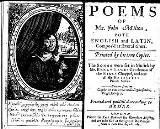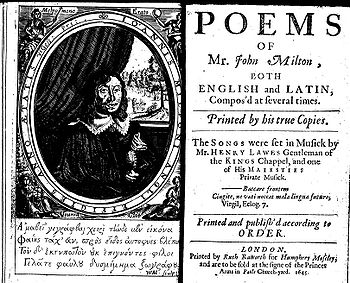
Milton's 1645 Poems
Encyclopedia

John Milton
John Milton was an English poet, polemicist, a scholarly man of letters, and a civil servant for the Commonwealth of England under Oliver Cromwell...
youthful poetry in a variety of genres, including such notable works as An Ode on the Morning of Christ's Nativity, Comus
Comus
In Greek mythology, Comus or Komos is the god of festivity, revels and nocturnal dalliances. He is a son and a cup-bearer of the god Bacchus. Comus represents anarchy and chaos. His mythology occurs in the later times of antiquity. During his festivals in Ancient Greece, men and women exchanged...
, and Lycidas
Lycidas
"Lycidas" is a poem by John Milton, written in 1637 as a pastoral elegy. It first appeared in a 1638 collection of elegies, entitled Justa Edouardo King Naufrago, dedicated to the memory of Edward King, a collegemate of Milton's at Cambridge who drowned when his ship sank in the Irish Sea off the...
. Appearing in late 1645 or 1646 (see 1646 in poetry
1646 in poetry
Nationality words link to articles with information on the nation's poetry or literature .-Works published:* Guillaume Colletet, Le Banquet des Poètes...
), the octavo
Octavo
Octavo to is a technical term describing the format of a book.Octavo may also refer to:* Octavo is a grimoire in the Discworld series by Terry Pratchett...
volume, whose full title is Poems of Mr. John Milton both English and Latin, compos'd at several times, was issued by the Royalist
Cavalier
Cavalier was the name used by Parliamentarians for a Royalist supporter of King Charles I and son Charles II during the English Civil War, the Interregnum, and the Restoration...
publisher Humphrey Moseley. The volume's frontispiece
Book frontispiece
A frontispiece is a decorative illustration facing a book's title page. The frontispiece is the verso opposite the recto title page. Elaborate engraved frontispieces were in frequent use, especially in Bibles and in scholarly books, and many are masterpieces of engraving...
contains an extremely unflattering portrait of Milton by the engraver William Marshall
William Marshall (illustrator)
William Marshall was a seventeenth century British engraver and illustrator, best known for his print depicting "Charles the Martyr", a symbolic portrayal of King Charles I of England as a Christian martyr.-Early career:...
, under which Milton placed satirical verses in Greek denying any resemblance. In 1673, a year before his death, Milton issued a revised and expanded edition of the Poems.
The book was published in 1646, according to The Concise Oxford Chronology of English Literature, notwithstanding the book's title page.
Organization
In addition to the first titlepage, the volume contains separate titlepages for the Latin Poemata and ComusComus
In Greek mythology, Comus or Komos is the god of festivity, revels and nocturnal dalliances. He is a son and a cup-bearer of the god Bacchus. Comus represents anarchy and chaos. His mythology occurs in the later times of antiquity. During his festivals in Ancient Greece, men and women exchanged...
(a.k.a. A Mask). There are also five sonnets and a Canzone written in Italian language that are not separately denoted. The order of the English poems is as follows:
- On the Morning of Christ's NativityOn the Morning of Christ's NativityOn the Morning of Christ's Nativity is a nativity ode written by John Milton in 1629 and published in his Poems of Mr. John Milton . The poem describes Christ's Incarnation and his overthrow of earthly and pagan powers...
- A Paraphrase on Psalm 114
- Psalm 136
- The Passion
- On Time
- Upon the CircumcisionUpon the CircumcisionUpon the Circumcision is an ode by John Milton that was possibly written in 1633 and first published in 1645. It discusses the Feast of the Circumcision of Christ and connects Christ's Incarnation with his Crucifixion.-Background:...
- At A Solemn Musick
- An Epitaph on the Marchioness of Winchester
- Song on May Morning
- On Shakespeare
- On the University Carrier [Hobson's Epitaph]
- Another on the Same
- L'AllegroL'AllegroL'Allegro is a pastoral poem by John Milton published in 1645. L'Allegro is invariably paired with the contrasting pastoral poem, Il Penseroso , which depicts a similar day spent in contemplation and thought.-Background:It is uncertain when L'Allegro and Il Penseroso were composed because they do...
- Il PenserosoIl PenserosoIl Penseroso is a vision of poetic melancholy by John Milton. Presented in the 1645 folio of verses, The Poems of Mr. John Milton, both English and Latin, Il Penseroso was presented as a companion piece to L'Allegro, a vision of poetic Mirth...
- Sonnets 1-10
- ArcadesArcades (Milton)"Arcades" is a masque written by John Milton and performed on 4 May 1634. The piece was written to celebrate the character of Alice Spencer, the Countess Dowager of Darby, widow of Ferdinando Stanley, 5th Earl of Derby, during her 75th birthday...
- LycidasLycidas"Lycidas" is a poem by John Milton, written in 1637 as a pastoral elegy. It first appeared in a 1638 collection of elegies, entitled Justa Edouardo King Naufrago, dedicated to the memory of Edward King, a collegemate of Milton's at Cambridge who drowned when his ship sank in the Irish Sea off the...
- A Mask [Comus]
The Latin poems are divided into "Elegiarum" (Elegies) and "Sylvarum Liber" and conclude with the Epitaphium Damonis, a poem mourning the death of Milton's best friend, Charles Diodati. In terms of themes and organization, this section "balances and speaks to the English collection."
Significance
Though many of these poems are marvels in their own right, critics are divided on how to read the volume as a whole in the scope of Milton's entire poetic career, which is invariably seen as culminating in the epic poem Paradise LostParadise Lost
Paradise Lost is an epic poem in blank verse by the 17th-century English poet John Milton. It was originally published in 1667 in ten books, with a total of over ten thousand individual lines of verse...
. Taking a quote from Vergil's
Virgil
Publius Vergilius Maro, usually called Virgil or Vergil in English , was an ancient Roman poet of the Augustan period. He is known for three major works of Latin literature, the Eclogues , the Georgics, and the epic Aeneid...
Georgics
Georgics
The Georgics is a poem in four books, likely published in 29 BC. It is the second major work by the Latin poet Virgil, following his Eclogues and preceding the Aeneid. It is a poem that draws on many prior sources and influenced many later authors from antiquity to the present...
, Milton identifies himself as a "future poet" on the title page. Some commentators take this as evidence that Milton was self-consciously preparing himself for a greater work. Others, on the other hand, argue that Milton's self-presentation is of "a plural and shifting subject" whose poetic trajectory is not set in stone.
It is also debatable to what extent the volume embraces the republic
Republic
A republic is a form of government in which the people, or some significant portion of them, have supreme control over the government and where offices of state are elected or chosen by elected people. In modern times, a common simplified definition of a republic is a government where the head of...
an politics Milton had begun to adopt by this time. Milton's publisher, Moseley, supported Royalist poets, such as Edmund Waller
Edmund Waller
Edmund Waller, FRS was an English poet and politician who sat in the House of Commons at various times between 1624 and 1679.- Early life :...
, and the volume contains praises of aristocrats and traditionally Royalist forms, like masque
Masque
The masque was a form of festive courtly entertainment which flourished in 16th and early 17th century Europe, though it was developed earlier in Italy, in forms including the intermedio...
. Yet a strong argument can be made that Milton did subtly inscribe his radical Puritan
Puritan
The Puritans were a significant grouping of English Protestants in the 16th and 17th centuries. Puritanism in this sense was founded by some Marian exiles from the clergy shortly after the accession of Elizabeth I of England in 1558, as an activist movement within the Church of England...
politics in the Poems through such works as Lycidas
Lycidas
"Lycidas" is a poem by John Milton, written in 1637 as a pastoral elegy. It first appeared in a 1638 collection of elegies, entitled Justa Edouardo King Naufrago, dedicated to the memory of Edward King, a collegemate of Milton's at Cambridge who drowned when his ship sank in the Irish Sea off the...
.

